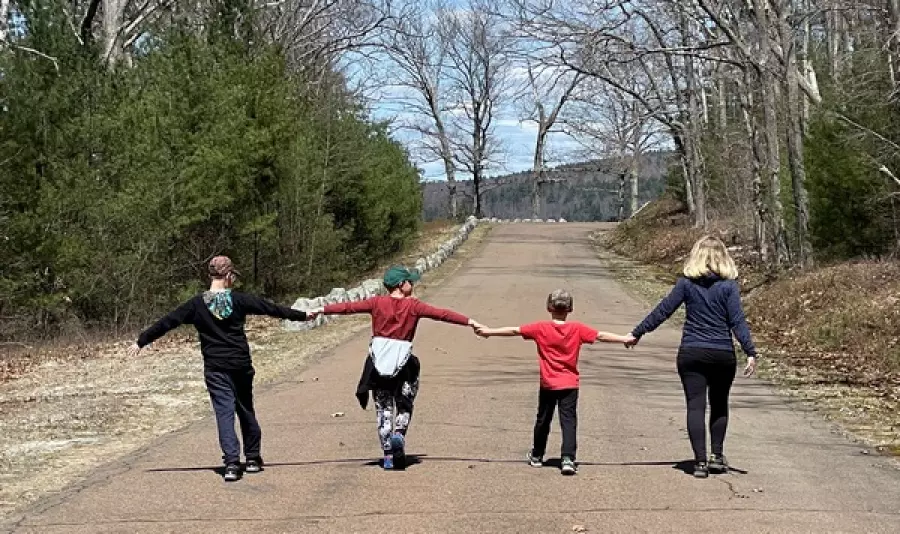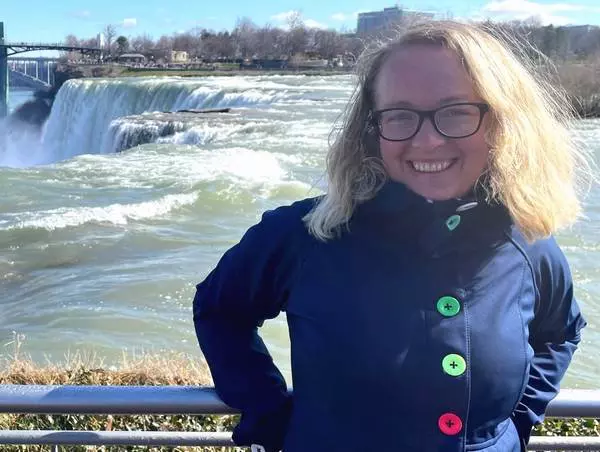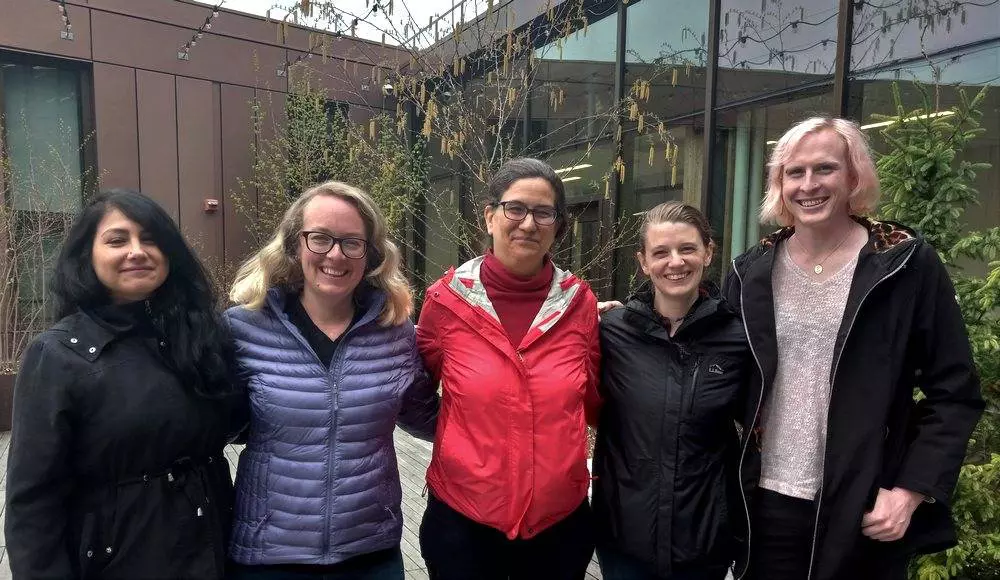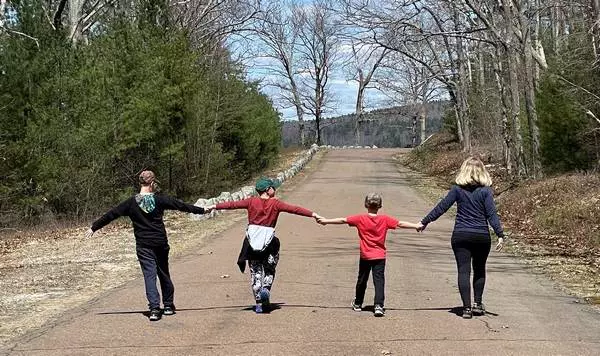
Lenka Slavíková působí na Fakultě sociálně ekonomické Univerzity J. E. Purkyně v Ústí nad Labem a v roce 2022 pobývala díky Fulbright-Masarykovu stipendiu devět měsíců na University of Massachusetts, Amherst. Jaká byla její zkušenost s životem v Massachusetts? A s čím se musí vyrovnávat rodiče-vědci, kteří do zahraničí vyjíždí se svými školou povinnými dětmi?
 Lenka Slavíková is an Associate Professor of Public Economics at the Faculty of Social and Economic Studies of Jan Evangelista Purkyně University in Ústí nad Labem, North Bohemia. She has just finished her 9-month stay at the University of Massachusetts, Amherst as a senior research Fulbright-Masaryk grantee. Passionate about the environment, Lenka focuses her research on the role of landowners in adopting flood and drought risk mitigation measures on their land. As Lenka reflects at the end of her stay in the U.S., one of the greatest challenges of her international experience was the same thing that originally sparked the idea to submit her Fulbright application - the integration of her three sons, ages 7, 10, and 12, into a foreign language environment.
Lenka Slavíková is an Associate Professor of Public Economics at the Faculty of Social and Economic Studies of Jan Evangelista Purkyně University in Ústí nad Labem, North Bohemia. She has just finished her 9-month stay at the University of Massachusetts, Amherst as a senior research Fulbright-Masaryk grantee. Passionate about the environment, Lenka focuses her research on the role of landowners in adopting flood and drought risk mitigation measures on their land. As Lenka reflects at the end of her stay in the U.S., one of the greatest challenges of her international experience was the same thing that originally sparked the idea to submit her Fulbright application - the integration of her three sons, ages 7, 10, and 12, into a foreign language environment.
What was her experience?
The idea to experience life in a foreign country came to us about three years ago. We wanted to expose our three kids to a foreign language and environment. To make it happen, there had to be, of course, eligibility for funding, a flexible and supportive partner, courage to get through all the paperwork, etc. As far as I remember we did not give our children much space to be part of the decision when and where to travel. The COVID pandemic increased the uncertainty of what will happen next month enormously and added one extra sheet to each of the already existing documents.
Now, almost at the end of our 10-month stay in Massachusetts (USA) it is a good time for a reflection. Moving to a foreign country with children doubled the number of necessary arrangements, such as medical reports, complete vaccination check and Czech and American school requirements. It also gave us no other option than to rent a big house and to buy a big car. But all these technical details were nothing compared to the first clash of the kids with the foreign language environment.
Of course, all our boys (age 7, 10 and 12) had learned English for several years before our trip. Of course, we intensified the language training a few months before departure. Still, there was a huge difference between knowing how to say “octopus” or “ruler” and actually communicating in a foreign language for the whole day. The first reaction was a shock, followed by crying, headaches, stomach-aches and one of them even threw up. Another son of ours developed a unique survival strategy and kept replying “I don´t understand” to all teacher attempts during the first weeks. Being all masked did not really improve the situation. Looking back, I see the first month-ish rather blurred. At that time, the only thing that I was able to focus on was to support my kids.
Photo 2: The “must have” photo from the campus of the University of Massachusetts, Amherst, Fall 2021.
However, nothing gets eaten as hot as it gets cooked, right? So it was fascinating to watch how our situation got better every week and to compare different adaptation tactics pursued by our sons. It was obvious that the state of Massachusetts has a well functioning school system, with excellent special English teacher support.
In Czechia, I have heard a lot about inclusiveness in public elementary education (and also how it is difficult to achieve it and how parents should try more). Well, in New England, I finally experienced how it looks. And it was simple: all children were able to get to schools, to eat there and to meet all their school-related duties REGARDLESS who their parents were and if they cared about the school or their kids. There were school buses and free lunches available. The additional support from schools was offered on a daily basis, because at the end there wasn't really a problem giving the kids rain boots or extra exercise books, if needed. To be able to do it, schools kept running a high number of small fundraising campaigns (e.g. the baking contest raised more than 500 USD) and/or asked parents to donate missing items (such as extra winter clothes). Donations and local fundraising campaigns were an important and integral part of community service provision.
Photo 3: Discussion group of the UMass Department of Geosciences leaded by Prof. Eve Vogel, January 2022.
Further, we very much enjoyed the intensive connection of teachers with us, parents. Every Friday, we get an email report describing what happened in the particular class and what needs to be prepared for the next week. Any of our concerns (and there were some at the beginning) were promptly solved. Seems like American teachers are ready to answer emails immediately at almost any time of the day (including weekends). My husband and I were repeatedly invited to speak to our sons' classes about our research, experiences with living in a foreign country, etc.
We also learned that reading (i.e. to make kids read the actual books) is an important thing, here. And that best way to do it was to have the small library directly in the school. Our children were excited about it and visited it on a daily basis. This was how they really started reading in English. Our oldest son who attended the 7th grade in the Middle School got super-absorbed by Science classes, in which they built the model of human digestive system and watched it functioning, studied living crayfish or dissected the pig lungs.
At the end of our stay, we were happy to see that all of our sons were fully integrated. They are leaving with the feeling that they made it despite all the struggles. This, in my opinion, is quite an important lesson for them. They experienced an open environment, in which everyone is respected regardless of their actual skills and origin, but also regardless of what they like to wear or what is their hair color. We all enlarged our geographical horizons enormously (seeing that Europe is in fact quite a small part of the whole world).
My husband once told me that I would have been much more productive without the family (cause being the mother I, of course, was not able to ignore all the quarantines, illnesses and school difficulties). That may be true. But I would not exchange the higher scientific performance for being here all alone. The stay helped us to get together as a family and to experience the spectacular adventure we will always remember. I am grateful to the Fulbright program to make it happen!
Photo 4: One of Lenka's frequent early spring walks around Quabbin Reservoir in Massachusetts, March 2022.
 Zdroj: Komise J. Williama Fulbrighta
Zdroj: Komise J. Williama Fulbrighta
Rozhovor vyšel v lednu 2022 v rámci blogu Komise J. Williama Fulbrighta s názvem Fulbright Reality Czech.
- Autor článku: ne









































